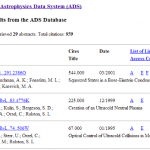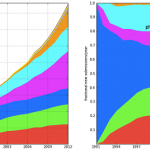Publishing
Paige Brown Jarreau, who blogs at From the Lab Bench is in the throes of writing her dissertation about science blogging, and plowing through a lot of interview data. She's sharing some of the process on the blog, and a lot more on Twitter, where it's prompted a good deal of discussion.
One of the big things she's brought up recently is the question of why scientists seem to blog about their own research only on rare occasions (Storify link). My own answer is in there somewhere: blogging about something you're actively working on doesn't feel like a departure from doing work. If you're going…
I got a royalty statement yesterday for How to Teach [Quantum] Physics to Your Dog (it continues to sell steadily, which is very gratifying), which includes a breakdown of the sales in terms of different formats. That reminded me of a particular annoying quirk of many recent discussions of the state of modern publishing, which is the often unsupported assertion that everything is ebooks these days, and paper books (and book stores) are just a small residual element that publishers and authors cling to out of historical affection.
Since I happen to have my royalty statements in front of me,…
There was another round of the "who counts as a scientist?" debate recently, on Twitter and then on the Physics Focus blog. In between those, probably coincidentally (he doesn't mention anything prompting it), Sean Carroll offered a three-step definition of science:
Think of every possible way the world could be. Label each way an "hypothesis."
Look at how the world actually is. Call what you see "data" (or "evidence").
Where possible, choose the hypothesis that provides the best fit to the data.
This isn't quite the way I would put it-- I'm an experimentalist where Sean's a theorist, so I…
I saw a bunch of people yesterday tweeting approval of John Hawks's complaint about academic timidity when it comes to blogging:
The bottom line is: People need to decide if they want to be heard, or if they want to be validated. I have long been an associate editor at PLoS ONE, and once I edited a paper that received a lot of critical commentary. That journal has a policy of open comment threads on papers, so I told disgruntled scientists to please write comments. The comments appear right with the article when anybody reads it, they appear immediately without any delay, and they can form a…
For something related to the book-in-progress, I was reading Raymond Chandler's classic essay "The Simple Art of Murder" last night, and stumbled across the following quote, where he laments the number of stories in print in the mystery genre in 1950:
In my less stilted moments I too write detective stories, and all this immortality makes just a little too much competition. Even Einstein couldn’t get very far if three hundred treatises of the higher physics were published every year, and several thousand others in some form or other were hanging around in excellent condition, and being read…
Last Friday, when I didn't have any time to blog, Zen Faulkes wrote an interesting wrap-up post on Science Online 2013 in which he declared he won't be back. Not because it was a bad time, but because other people would benefit from it more, and his not going frees up a spot for somebody else.
I recognize a lot of his reaction, though there were a couple of things that I got out of it that I think made it worthwhile, beyond just the socialization. On the whole, though, it wasn't really a transformative experience for me. I like to think, though, that I was able to provide a few things that…
OK, it's a paper I mentioned here before, when it went up on the arxiv, but the "Comments on Atomic, Molecular, and Optical Physics" article I wrote this summer is up on the Physica Scripta web site now, and for the next not-quite-thirty days it's free to read and download:
Searching for new physics through atomic, molecular and optical precision measurements
We briefly review recent experiments in atomic, molecular and optical physics using precision measurements to search for physics beyond the Standard Model. We consider three main categories of experiments: searches for changes in…
In which we look again at the question of why, despite the image of physicists as arrogant bastards, biologists turn out to be much less collegial than physicists.
------------
While I was away from the blog, there was a spate of discussion of science outreach and demands on faculty time, my feelings about which are a little too complicated to boil down to a blog post in the time I have available. I did notice one thing in Jeanne Garb's guest blog post at Nature Networks:
Yet, given the current system, most scientists are choosing to keep a closed-notebook policy because they fear getting…
Steve Hsu has a post comparing his hand-drawn diagrams to computer-generated ones that a journal asked for instead:
He's got a pretty decent case that the hand-drawn versions are better. Though a bit more work with the graphics software could make the computer ones better.
This reminded me, though, of something I've always found interesting about scientific publishing, namely the evolution in the use of figures through the years. Whenever I need to do literature searching, I always suspect you could guess the approximate date of a paper's publication by looking at the figures.
If you go back…
Over at the Scholarly Kitchen, Kent Anderson complains about the uselessness of comments on journals:
Comments in online scientific journals have been notoriously poor -- either too much material of uneven quality or too little discussion to amount to a hill of beans. All too often, commenting has to be shut down because internecine and tiresome debates break out, creating more noise than signal. The best comments are scholarly, and borrow extensively from the form of letters to the editor.
After more than a decade and millions of blogs, it seems one main lesson practitioners are learning --…
There's been a lot written recently about academic publishing, in the kerfuffle over the "Research Works Act"-- John's roundup should keep you in reading material for a good while. This has led some people to decide to boycott Elsevier, including Aram Harrow of the Quantum Vatican. I'm generally in favor of this, but Aram says one thing that bugs me a bit:
Just like the walled gardens of Compuserve and AOL would never grow into the Internet, no commercial publisher will ever be able to match the scope and ease of access of arxiv.org. Nor can they match the price. In 2010, there were about…
My course this term is on time and timekeeping, but is also intended as a general "research methods" class. This was conceived by people in the humanities, where the idea of generic research methods makes a lot more sense than in the sciences (where there's a lot more specialization by subfield), but I'm going to try to give as general an overview of how to approach scientific research as possible in a course with no prerequisites. The following is sort of a rough sketch of a lecture for next week, on how to approach the scientific literature, so comments and suggestions are welcome. This is…
I've been incredibly busy this term, but not so busy I couldn't create more work for myself. Specifically, by writing an opinion piece for Physics World about the FTL neutrino business, that just went live on their web site:
The result quickly turned into one of the most covered physics stories of the year, with numerous articles in magazines, newspapers and on television asking whether "Einstein was wrong". Just as quickly came numerous physicists denouncing the media frenzy, with Lawrence Krauss from Arizona State University and Cambridge University cosmologist Martin Rees both calling the…
This coming June will mark ten years since I started this blog (using Blogger on our own domain-- here's the very first post) and writing about physics on the Internet. This makes me one of the oldest science bloggers in the modern sense-- Derek Lowe is the only one I know for sure has been doing this longer than I have, and while Bob Park's "What's New" and John Baez's "This Week's Finds" have been around longer, they started out as mailing lists, not true weblogs.
As such a long-term denizen of the Internet, I'm pretty much contractually obliged to have an opinion about Michael Nielsen's…
Via Bee, we have the BlaBlaMeter, a website that purports to "unmask without mercy how much bullshit hides in any text." Like Bee, I couldn't resist throwing it some scientific text, but rather than pulling stuff off the arxiv, I went with the abstracts of the papers I published as a grad student, which I wrote up on the blog as part of the Metastable Xenone Project a few years ago. The abstracts, their scores, and some comments below:
Paper 1: Optical Control of Ultracold Collisions:
Near-resonant light is used to modify the collision dynamics of magneto-optically trapped metastable xenon…
Via Twitter, Daniel Lemire has a mini-manifesto advocating "social media" alternatives for academic publishing, citing "disastrous consequences" of the "filter-then-publish" model in use by traditional journals. The problem is, as with most such things, I'm not convinced that social media style publication really fixes all these problems. For example, one of his points is:
The conventional system is legible: you can count and measure a scientist's production. The incentive is to produce more of what the elite wants. In a publish-then-filter system nobody cares about quantity: only the impact…
The "peer reviewers get worse" item in this morning's Links Dump drew an immediate comment elsewhere to the effect of "of course they do, because they start pawning reviews off on their students. This one was a surprise to me, so here's a quick poll to see if my subfield of physics is really that much more collegial and ethical than the rest of science:
Handing a referee report for a grant or paper off to be written by a grad student or post-doc is:customer surveys
Refereeing takes place via classical communications channels, so you may only choose one option.
My experience is that while I…
Continuing our series of science-themed Christmas tree ornaments, we have this cute pair of reading bears:
"But wait," you say, "reading isn't a science!" Ah, but while reading itself may not be a science, science is nothing without the scientific literature. The really essential step in the process of science is the communication of scientific results to others. That's what allows future scientists to "stand on the shoulders of giants," to borrow a phrase from Newton, using past results as the basis for future experiments. Reading the results of others is absolutely essential to science.…
In a place I can't link to, I encountered the somewhat boggling statement that "Nature leans more in the direction of Popular Science than Critically Peer Reviewed [Journal]." Thus, a quick poll:
Nature is:online surveys
Context is for the weak.
Over at Tor.com, Jo Walton is surprised that people skim over boring bits of novels. While she explicitly excludes non-fiction from her discussion, this immediately made me think of Timothy Burke's How to Read in College, which offers tips to prospective humanities and social science majors on how to most effectively skim through huge reading assignments for the information that's really important.
I've mentioned this before, but I don't think I've done a science version. I've been doing more reading of journal articles lately than I have in a while, though, and it occurs to me that similar…

